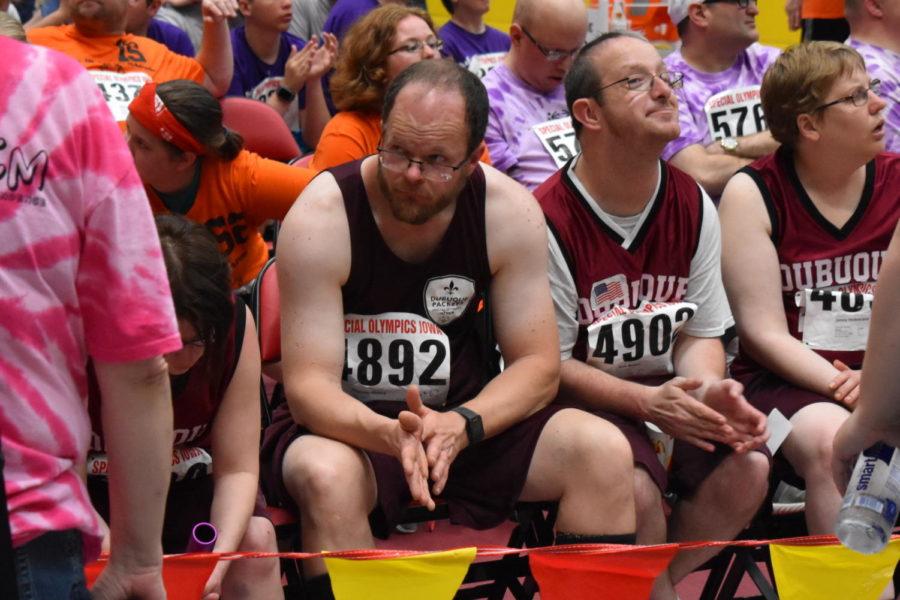Iowa Special Olympics: more than a competition
May 26, 2019
In front of thousands of spectators and as a part of an ESPN broadcast, Josh Hickey marched forward with a cloudy Washington sky above him. His feet touched the ground of University of Washington’s Husky Stadium — where thousands of touchdowns have been scored and hundreds of thousands of bone-jarring hits have taken place, but Josh wasn’t about to play football under the stadium lights — he held a torch in his hand.
Josh Hickey, from Dubuque, Iowa, was the torch bearer for the opening ceremony of the 2018 USA Special Olympic Games in Seattle, Wash.
Josh is one of the three out of the four children — Josh, Shannon and Nick — in the Hickey family with special needs. At the 2019 Iowa Special Olympics, the Hickey family won the Family of the Year award.
Prior to being the opening ceremony, Josh, 32, said he first received a call from an official associated with the national organization a month prior to the games, saying he had been selected to be a part of the torch run.
Having been competing with Special Olympics since 2000, Josh said he was appreciative of not only the opportunity to be the torch bearer and be a part of the games in Seattle but also for having the event broadcast on national television.
“Being on national TV — which I give credit to ESPN for doing that,” Josh said. “I told them too, I said ‘The more you broadcast, the more people will see the differences.’”
At the games, Josh said his aunt and her two twins, who live in the Seattle area, were able to see Nick and the other athletes compete, and he said they were blown away. They never expected someone with special needs to be able to compete like they did.
While the national games were held at Washington and broadcast on national television, the facilities were a far cry when the Hickey family first started competing in the Special Olympics — especially at the local level.
For competitions, Shannon, 39, said most of the events he attended when he first started in middle school were held in towns in eastern Iowa and Dubuque.
It wasn’t until 2006 when the first national games were first held, with Ames as the host city.
Shannon said he delivered the Special Olympics oath in front of 3,000 athletes from across the country.
Mike — the father of Josh, Nick and Shannon — said he has seen a considerable difference in the availability of local facilities from when Shannon — his eldest athlete — first started competing.
In the early days, Mike said only one or two schools would be open to allowing the Special Olympians practice, but now he said most facilities are readily available when the school isn’t using them.
“Now all you have to do is make one phone call, and I could guarantee five or six opportunities could open up in a short hour time span,” Mike said.
For niche events such as high jump, Mike said there aren’t publicly available facilities, so he must get in contact with local colleges and high schools so the Dubuque Special Olympians can practice.
When they won the Iowa Special Olympics Family of the Year, Mike said the officials of the ceremony were going through the awards, and he was listening to the usual annual awards such as coach or athlete and then they got to Family of the Year.
“Then when they said our name, I was like, ‘I didn’t hear that right,’” Mike said.
Shannon said Mike helps coach the 34 total athletes on the Dubuque team and said when they won the Family of the year award, their teammates congratulated them.
For the last several years, Shannon said Mike has increased how much he is involved since he retired.
“I just love them to death because they’ve been doing it for a long time,” Nick said.
In Shannon’s first Olympics event ever, he said he was unsure if he would even be able to event make it let alone place.
On the bowling lanes, Shannon placed in his first event and Mike said he couldn’t have been prouder regardless of how he finished due to all the hard work had put in.
For the games, the Hickey’s practice for events three days a week and then bike, run or walk on the other days of the week.
Mike said Shannon had a sense of relief when he finished.
“I was so proud of him — I didn’t care if he came in first , second or last. He gave the effort and really enjoyed what he was doing and then to see him congratulating all the other ones no matter what position he got in was — that was better than winning any medal,” Mike said.
Despite the visits to the podium and the gold and silver medals on their necks, the Hickeys say the Special Olympics are deeper than the place you finish.
Mike said he wants to get people involved no matter their age due to the sense of camaraderie infused into the games.
Josh said he enjoys the inclusivity of a diverse range of ages from kindergarten competitors to those more than 80 years of age.
For Nick, he said the Special Olympics is a place to develop bonds and everlasting friendships.
“I like all the athletes, I like the smiles, I like to encourage all the athletes when I compete with them and hopefully in these towns there will be more athletes competing,” Shannon said.
At the Special Olympics, the athletes leave with more than a medal.
















